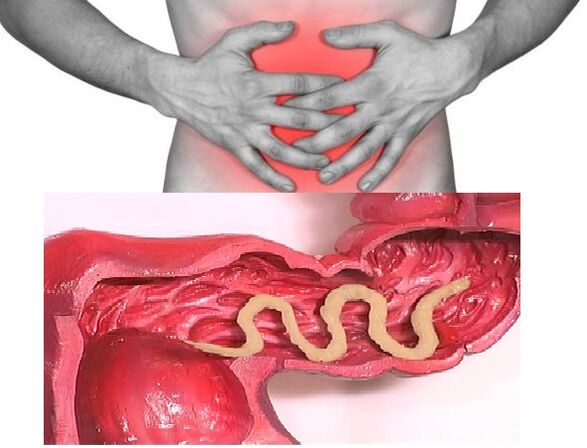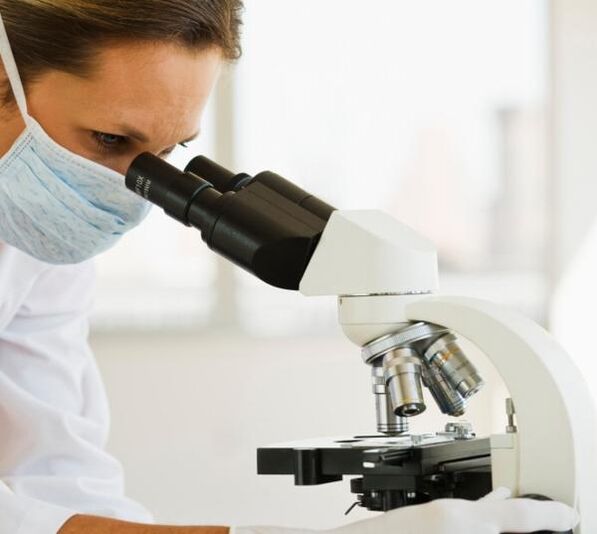Many do not think that they have parasites in their bodies. Moreover, if people often have health problems, they do not doubt that the culprits of this condition are microorganisms that exist at the expense of the owner.
At this time, the worms cause various helminthiases (ascariasis, enterobiasis, echinococcosis, trichinosis, etc. ). In the absence of deworming, a person has a number of different complications.
Thus, if helminthic invasion is not treated in childhood, mental and physical development may be delayed. Organs affected by worms contribute to the formation of inflammation, and parasites do not pass even after removal.
But how to determine the presence of parasites in the body at home? What are the symptoms and diseases that accompany different types of helminthiasis?
What to look for to identify worms in humans

Rough skin, the appearance of spots, acne, baldness and premature wrinkles - all these manifestations can indicate the presence of parasitic microorganisms. In addition, problems with the nails or cracks in the heels (damage to the digestive organs) may indicate helminthiasis, and sometimes there may be a connection between psoriasis and lamblia.
Often the above symptoms are caused by lamblia or Trichomonas. However, it has a negative effect on the immunity to any helminthic invasion.
This, in turn, leads to the following symptoms:
- sinusitis;
- angina;
- polyps;
- inflammation of the paranasal sinuses;
- sudden snoring.
To recognize parasites in men, you should pay attention to the presence of adenomas, cystitis, impotence, prostatitis, stones and sand in the kidneys and bladder. Some worms affect the brain and affect the development of future generations.
The following symptoms will help to find out what parasites are present in women:
- myoma;
- painful sensations during menstruation;
- fibroma;
- violation of the menstrual cycle;
- disorders of the bladder and kidneys;
- fibrocystic breast disease;
- inflammation of the ovaries.
It is worth noting that pinworms with appendicitis, biliary dyskinesia or pancreatitis indicate opisthorchiasis.
Hookworm larvae that penetrate the lungs often cause false pneumonia. In addition, some types of helminthiasis are similar to angina or bronchitis.
Symptoms of parasites in the human body are:
- insomnia, constant anxiety and anemia;
- weakening of immunity;
- avitaminosis;
- discomfort in the gastrointestinal tract, constipation, dysbiosis;
- changes in weight;
- allergic reactions;
- nervousness and anxiety;
- skin problems.
Symptoms of the presence of parasites in the body

To understand whether you or I have helminths, you need to look at a number of symptoms that are very different. Typically, large worms contribute to constipation because they block the bile and intestinal canals, which interferes with natural bowel movements.
A certain type of parasite secretes special substances to thin the feces. Therefore, diarrhea is not always a symptom of a gastrointestinal disorder, but often indicates the presence of parasitic microorganisms in the human body.
Parasitic microorganisms also cause swelling and flatulence. This happens when helminths enter the small intestine and provoke an inflammatory process there.
Irritable bowel syndrome is another symptom of helminthic fever. Thus, the worms promote poor absorption of fat, which in turn enters the large intestine, so there is an increase in the amount of feces. This causes cramps, diarrhea and constipation.
Some types of worms may be present in muscle and joint fluid. Therefore, its presence in these areas causes painful sensations similar to the symptoms of arthritis. In fact, this disorder is caused by inflammation, which is an immune response to the presence of worms.
Allergic manifestations are a characteristic feature of many types of helminthiasis. After all, the toxins secreted by worms cause an immune response that requires the production of many eosinophils. However, the abundance of protective cells contributes to the formation of inflammation, which results in allergies.
Worms often cause skin rashes, eczema, acne and other problems. Thus, the simplest parasites cause ulcers, papillomas and dermatitis.
Helminthic invasion is almost always accompanied by anemia. This is because after entering the intestine, the worms attach to the mucous membrane and absorb food from the host's body. Trichomonas, which feeds on blood cells in particular, is a concern and results in significant blood loss.
People with helminthiasis often have weight problems. Thus, excess body weight indicates that the worms are poisoning the human body with toxins or consuming glucose. And excessive subtlety indicates disorders in metabolic processes.

Due to the deterioration of well-being caused by helminthic fever, the patient becomes very nervous and emotionally unstable. As a result, worm waste poisons the host, adversely affects the nervous system, resulting in the patient being depressed.
Insomnia is a characteristic sign of parasites being active in the body. Therefore, if a person often wakes up at 2-3 o'clock in the morning, then he should contact a parasitologist, because this is when the liver tries to clear all toxins. In addition, roundworms or pinworms come out of the anus at night, causing itching and irritation.
In patients under 15 years of age, worms often cause tooth decay during sleep. Thus, the nervous system reacts to toxins secreted by worms.
Almost every helminthiasis is accompanied by chronic fatigue syndrome, characterized by memory impairment, apathy and flu-like symptoms. This indicates a lack of nutrients eaten by pathogenic microorganisms.
With long-term helminthic invasion, the patient's body develops immune disorders. After all, the vital activity of worms greatly reduces the body's defenses, resulting in the development of allergic manifestations and creates favorable conditions for the penetration of the infection.
Prolonged parasitism of harmful microorganisms damages such organs and tissues, against the background of which oncological diseases develop. In this case, foci of inflammation occur and the body experiences malnutrition.
All this is complemented by malfunctions in the immune system. Thus, favorable conditions are created for the emergence of various oncological diseases.
Certain types of worms are localized in the human respiratory system and cause inflammation in the organs. As a result, the following symptoms appear:
- Runny nose;
- temperature rise;
- cough;
- pneumonia;
- asthma.
How is helminthiasis detected using medical research?

If you have any of the above symptoms, you should consult a doctor to find out if there are any parasites in the body. You may need to visit a parasitologist, an infectious disease specialist, a gastroenterologist, a surgeon, sometimes an ENT specialist or an ophthalmologist, because it all depends on the location of the worms.
Often the diagnosis consists of an examination for the presence of an itch and feces eggs. However, such tests can be used to check for worms living in the intestinal tract or parasites that migrate along it (tapeworms and flatworms, livers).
Because eggs do not always come out of the anus, the test should be performed 2-3 times. Using these diagnostic methods, the following is detected:
- confusion;
- whipworms;
- ribbon worms;
- pinworms;
- schistosomes;
- roundworm;
- trichinella;
- worms.
Many types of helminths (leishmaniasis, lamblia, trypanosomiasis, echinococcus, plasmodia, amoeba, toxoplasmosis) can be localized in almost any tissue and organ, which is not informative in the analysis of feces. In this case, the patient must have a blood test for the presence of antibodies and antigens.
The material obtained is examined and examined to identify the parasite that lives in the liver of the host. If there is helminthic waste in the human liver, it indicates an infection.

















